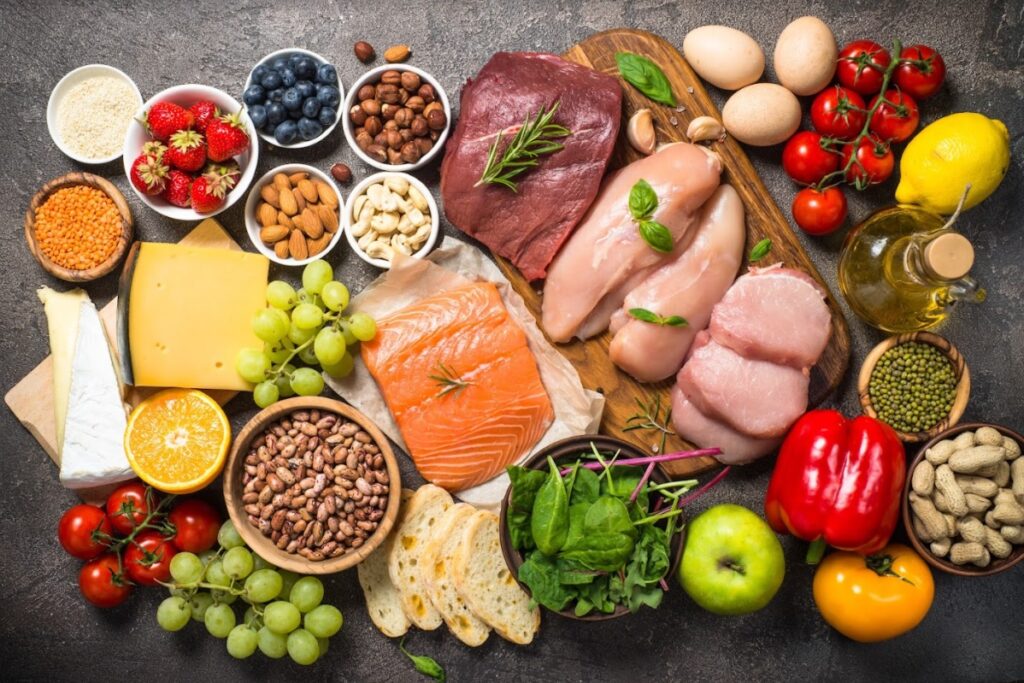We frequently place a strong emphasis on physical activity, stress reduction, and mental wellness in our pursuit for a healthy lifestyle. The strong connection between diet and sleep, on the other hand, is an important factor that is frequently ignored.
We spend over a third of our lives sleeping, so it’s important to understand how diet can have a big impact on the quality and length of our sleep. Establishing a regular sleep schedule combined with a balanced diet can positively impact your overall sleep quality and well-being
We will explore the complex interactions between diet and sleep in this blog, including the meals that support restful sleep and those that disturb it.
The Impact of Food Choices on Sleep Quality
Tryptophan, an amino acid included in many meals, is essential for the synthesis of serotonin and melatonin, two neurotransmitters that control sleep. Turkey, nuts, seeds, tofu, and dairy products are among the foods high in tryptophan.
Carbs enhance the availability of tryptophan in the brain, promoting greater sleep quality. Examples of complex carbs include whole grains, legumes, and vegetables.
While a morning cup of coffee gives you a much-needed energy boost, caffeine consumption right before night can make it difficult for you to get to sleep. Similar to how alcohol might make you feel sleepy at first but disturbs your sleep later on, giving you a fragmented night’s sleep.
Timing and Meal Composition
Irregular eating schedules and late-night meals can mess with our circadian cycle, making it difficult to fall asleep. To help maintain a regular sleep-wake cycle, set up a regular mealtime routine and stay away from heavy meals right before bed.
Eating spicy and high-fat foods can cause indigestion, heartburn, and other discomforts that can make it difficult to get to sleep and stay asleep all night.
Nutrients that Promote Healthy Sleep
Leafy greens, nuts, seeds, and whole grains are foods high in magnesium that can help relax the muscles and encourage deeper, more restful sleep.
Vitamin B6 is essential for the synthesis of serotonin, a neurotransmitter that controls sleep. Fish, poultry, bananas, and chickpeas are all excellent sources of vitamin B6.
Foods that increase melatonin levels include cherries, kiwis, and almonds. These foods contain melatonin, which can help with sleep regulation when included in a balanced diet.

Foods to Avoid
Caffeine is a common stimulant found in coffee, tea, energy drinks, and chocolate. It can stay in your system for several hours, making it difficult to fall asleep. To promote a better sleep schedule, it is advisable to avoid consuming caffeinated beverages and foods at least six hours before bedtime.
Spicy or heavy meals can cause discomfort, heartburn, and indigestion, leading to disrupted sleep. Foods high in fat content, such as fried or greasy dishes, require more time for digestion, which can interfere with your ability to fall asleep. It’s best to opt for light, easily digestible meals in the evening.
While indulging in sugary treats may seem tempting, especially in the evening, they can negatively affect your sleep. Consuming sugary foods elevates blood sugar levels quickly, leading to a burst of energy that can interfere with falling asleep. It’s wise to limit your intake of sugary desserts and opt for healthier alternatives like fruits or yogurt.
Although alcohol may initially make you feel drowsy, it can disrupt your sleep patterns. It affects the quality of sleep by reducing REM (rapid eye movement) sleep, which is vital for deep restorative sleep. Avoid consuming alcohol close to bedtime if you want to ensure a more restful night’s sleep.
While protein is essential for a balanced diet, consuming high-protein foods before bed can hinder your sleep. Protein-rich foods like red meat, poultry, and beans require more time to digest, causing discomfort and potentially disturbing your sleep. If you crave a late-night snack, choose a small portion of low-fat dairy or a handful of nuts instead.
Carbonated beverages like soda and sparkling water can cause bloating and gas, leading to discomfort and difficulty in falling asleep. Furthermore, the high sugar or caffeine content in some carbonated drinks can exacerbate sleep disturbances. Opt for hydrating alternatives like water or herbal tea.
Tyramine is an amino acid that can trigger the release of norepinephrine, a brain stimulant, and potentially disrupt sleep. Foods high in tyramine include aged cheeses, processed meats, soy products, and some fermented foods. Avoid consuming these foods close to bedtime to promote better sleep.
Lifestyle Factors
The many benefits of regular hydration for overall health include maintaining a healthy sleep cycle. It’s preferable to drink less water in the evening, though, as drinking too much before bed may result in intrusive midnight toilet trips.
Obesity and sleep apnea are frequently linked, making weight loss a priority. A healthy weight and balanced food can help you sleep better and lower your risk of developing sleep apnea.
Conclusion
It is a fact that diet and sleep are related. Our eating habits and general wellbeing can be positively impacted by the intentional decisions we make about what we eat and when. We may greatly improve the quantity and quality of our sleep by prioritizing a diet high in tryptophan, complex carbs, and nutrients that promote sleep while avoiding caffeine, alcohol, and big meals just before bed. By being mindful of the foods we consume before bed, we can significantly improve our sleep schedules. Always keep in mind that getting a good night’s sleep is essential to living a happy and healthy life.
